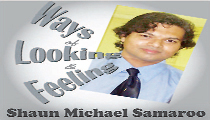Yesterday marked the 28th year since the Guyanese nation experienced the sudden demise of its first Executive President, Forbes Burnham. On August 6, 1985, the nation felt a stunned numbness when the lone radio station announced in sombre tones that President Burnham had died.
Two leaders shaped this nation, giving it not only birth, but its national character, unique being, and that quintessential Guyanese flavour. These two lifelong friends, the indomitable working class leader Dr Cheddi Jagan and the brilliant orator and English-language aficionado Forbes Burnham, made us who we are today.
The occasion of Burnham’s demise passes quietly this week, with hardly a stir about his role in defining us Guyanese. Yet, Burnham is emerging from the shadows, with two volumes of his brilliant speeches published through the Ministry of Culture’s Caribbean Press. That’s excellent news, and an optimistic sign that we can face our past to achieve the healing in our national psyche that we so desperately say we need.

When we do glance back, we see and feel subjective, emotional, irrational suspicions.
For us to design the way forward, to create the future we are capable of, to achieve the potential of the Guyana Dream, to be the Breadbasket of the Caribbean, we must learn to see and feel the heartbeat of our national shapers and moulders, a la America with Abraham Lincoln and George Washington.
In that state of apathy shunning what shaped us, we stumble ahead, eventually to realize we’re in a perpetual circle, steeped in the divisive instincts that confronted us when we encountered each other under the Colonial need for labour on those sun-starched Demerara, Berbice and Essequibo plantations. We still stare at each other across walls of misunderstanding in suspicious consternation.
When Dr Jagan and Burnham gave birth to Guyana, with our own passport, flag, national anthem and that revealing pledge of reaction to our divisiveness, One People, One Nation, One Destiny, we faced the future with much aspiration and anticipation.
Now, today, Burnham’s role in choosing to name this nation Guyana, in installing that damned 1980 Constitution, and in a million other ways, good and not so good, is too important, too defining for us to forget him or his legacy or his stamp on our consciousness, our awakening.
Every Guyanese should read his speeches, and in fact, the Ministry of Education may want to include the Caribbean Press’ publication of his speeches and the books of Dr Cheddi Jagan in the national school curriculum.
Forbes Burnham’s history is fascinating. He descended from slaves on a plantation in Barbados that an English family named Burnham owned. The freed slaves maintained the Burnham name of the slave-owner.
Twin brothers chose to leave Barbados after slavery was abolished, with one brother heading to Panama, and the other to British Guiana.
Forbes’ father became a well-respected School Principal and Methodist Minister in Kitty, and the family became a distinguished Georgetown social icon, with Forbes gaining outstanding scholarships to Queen’s College and then to Oxford University in England, where he studied law and honed his leadership skills in the British West Indian student society.
When he became leader of Guyana, he was to work with other Caribbean leaders – Errol Barrow of Barbados, Eric Williams of Trinidad and Tobago, Michael Manley of Jamaica – to re-define the Caribbean’s social space. They had all studied together in Britain, and employed that British education to shape the Caribbean. Within short decades, the Caribbean had gained international status, and eventually produced world class scholars, intellectuals, Nobel Prize winners, and outstanding achievers in sports, academia and leadership.
Burnham’s role in Guyana, in the Caribbean, in fact in the Third World, is a study in geopolitical realpolitik, and way too significant for us to forget. In his personal life, he married a native of Trinidad and Tobago with family roots in St Vincent: Burnham was the ultimate Caribbean man, and it’s so fitting that the CARICOM Secretariat is here in Guyana.
His vision of self-sufficiency through national cooperativeness, along with Dr Jagan’s vision for human development now adopted at the United Nations, should galvanize us as a nation with a great heartbeat for who we’ve become, in this 21st century.
That’s where we’ve got to inspire and motivate ourselves to get: to see and feel who we grew up to be, looking at our ebb and flow, our fall and our rising, with sober rationality and intellectual integrity.
Our penchant for emotional, irrational rants and reacting with the connotation for divisiveness cannot see us become who we dream of becoming.
Burnham knew this. Dr Jagan knew this. Maybe our leaders failed to prepare us enough to face the future. But they faced enormous odds, birthing a nation, overcoming the sad remnants of colonialism, slavery, indentureship, the violation of the human rights of Amerindians under Colonial rule. These were incredible odds to beat. They had no time to babysit us. We’ve got to self-develop, just as they did. They both moved from rural under-development to become world statesmen and global visionaries.
We were six ethnicities facing each other with nowhere to turn to, having to understand and work with each other. Once we chose to stay in this new land, refusing to go back to our lands of origin, we had no choice but to overcome our cultural and linguistic differences, and work hand in hand to create a brand new nation.
This challenge of creating a new people must have inspired Burnham and Dr Jagan with a great zeal, and they both employed their ideologies and ideas in shaping the Guyanese social space with authentic dedication and a profound self-belief in their cause.
How do we see and feel about them today?
That question forms a foundation pillar of how we would build Guyana to achieve that Jagan dream of developing this nation to achieve its full human development.





